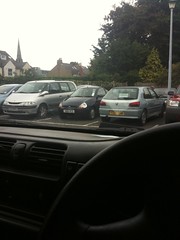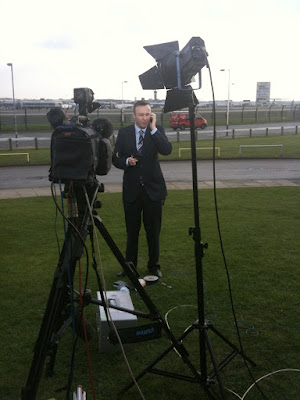I am always being asked this one particular question. Every TV News cameraman i know gets asked the same question. "How did you start in the industry?" The start of any news cameraman's career is as varied as a start in any media career, but times are changing rapidly in the news industry and ways in are becoming clogged with more and more people just starting out in their chosen line of work.
 |
| News cameras ... rapidly changing. |
There are of course a great many ways to become a news cameraman. The obvious choice is to study film making or photography at university or college, Media studies and TV production courses are now widely available around the country. Is that the best way to start? ... Maybe, maybe not. Taking three years out to study your chosen career seems a good idea, and it is. But these days there are no guarantees that a job will be waiting for you when you graduate, far from it.
I have lost count of the times i have been approached by young people for jobs. People who have graduated and find themselves without work in a media industry awash with graduates. Sorry guys, but that is just the reality of the situation right now.
There is of course another way. Getting a jump of three years on your university peers and going out there job hunting for work at the bottom of the industry pile. Runners, Cable basher, Courier. Get the foot in the door and work your way to the top. Good idea, commendable and shows good work ethic. But again, think about all those graduates you will be competing against for that job. It's never going to be easy.
 |
| Cameramen ... kept behind bars. |
There are a few trainee jobs out there, the BBC, SKY, ITN and others do occasionally advertise paid internships and full time camera position jobs, but they are few and far between, and when advertised, are hopelessly over subscribed. That's not to put you off, you may just be the lucky one.
So which route did i take? None of the above. I knew i wanted to be a news cameraman since leaving the army at the age of 28. I had no real qualifications to do the job, and had never used a broadcast video camera before. To cut a long story short, i had enough money to buy a new camera, lens, and microphone, and that was all. Over the next six months i taught myself through trial and error how to use the camera. I read and re read the instruction manuals and every how to book i could find.
More importantly though, i watched the news. All of it. Every channel and every bulletin. I watched every report and asked myself why certain pictures made it into the report, what sequences worked, the pieces to camera by the journalists, The length of the sequences and what words were being put with the video. I took apart each piece and asked myself why that report made it onto TV. I also practiced filming shots and sequences, framing and composition of the shots, and what every little button on the camera did and what happens when you press it.
After six months or so, i decided to look for freelance work. Every broadcaster i approached turned me away citing lack of knowledge, lack of a CV, and lack of experience. That was if they replied to me in the first place.
Persistence is the key here. I very nearly stopped looking, thinking that my rise to the top of broadcasting was a non starter. However, following one interview with a man at the BBC regional news in Southampton, i walked away with a days freelance work. 1 days work. That was in 1997, and i still work there today.
Based on
original article by Paul Martin.
Paul Martin
http://www.media-attention.co.uk



















